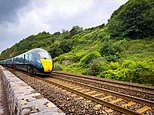
British rail travel has been on a downward trajectory in recent days.
From soaring ticket costs to the increasing strain of HS2,the industry seems to be under a growing pile of financial concerns.
It was recently announced that housands of train passengers across the UK are being warned to expect delays and cancellations over the Christmas period due to major engineering work on the railways.
Meanwhile, passengers commuting on British trains experience slower Wi-Fi speeds than their Romanian counterparts, new figures have revealed.
But now, a travel expect has revealed how to fix Britain’s broken railways.
Thomas Ableman, former Transport for London director of strategy and innovation, recently shared his thoughts on a strategy to make a difference – increasing the industry’s revenue.
But how can that be done without hiking up ticket fares so much that passengers are deterred?
In his recent blog, Thomas explained one option – introducing a small cost for a guaranteed seat reservation.
British rail travel has been on a downward trajectory in recent days. Thomas Ableman, former Transport for London director of strategy and innovation, recently shared his thoughts on a strategy to make a difference – increasing the industry’s revenue
He wrote: ‘We know from research (and from it being obvious) that the fear of not getting a seat is one of the biggest barriers to rail travel use.’
He added: How much more willing would you be to go into the office for an extra day or two if it didn’t risk standing for an hour in each direction.
‘If you could guarantee a seat, it might actually be… quite… nice?’
For just £1, a seat reservation could bring in much more cash for this industry.
Thomas estimated: ‘There are 1.7 billion journeys on the network each year. Let’s imagine that we can increase that by 2 per cent by eliminating the fear of not getting a seat (one of the biggest single barriers): that would be worth about £400 million in increased revenue each year.
‘Oh, and let’s assume for sake of argument, that 10 per cent of customers are willing to pay a quid for a guaranteed seat (no idea, making that up, but it’s a good start): that’s another £170 million.
‘So we’re at roughly £5.7 billion additional revenue over 10 years. Worth a research project to fix some operational issues?’
Another suggestion Thomas has is to introduce more first-class carriages.
The travel expect has revealed how to fix Britain’s broken railways, suggesting a range of options
He wrote: ‘Indeed, the gradual retreat of First Class across the UK railway is, I think, a strategic mistake.’
He added: ‘It’s one of the ways in which LNER has, I think, read the room better than many other operators: LNER’s really leaned into experience with a full dining offer on many First Class trains.’
Thomas added: ‘As our society builds a growing cohort of rich with high standards, the railway needs to be ready to respond. More first class and better first class. (And, under GBR, consistent first class).’
He also suggests moving the child-fare cut off to 19 to incentivise young people to stick with trains.
Thomas argues that railcards are also essential for the industry – but they need to be clearer and more streamlined to entice more people to buy them.
In an ideal world, he wants to follow the Swiss model: ‘A half-price card gives you 50 per cent off all public transport in Switzerland: trains, buses, ferries. So it’s a no-brainer to get one.’
While he recognises implementation of a model exactly like the Swiss one is not immediately feasible, he does believe the UK train system should have a loyalty product – a railcard – for everyone that is clear and easy to understand.
Thomas also suggested the introduction of ‘Awaybreak tickets’ recognising that the train fare is a bigger proportion of a day out than a long holiday.
One suggestion Thomas has is to introduce more first-class carriages
He wrote: ‘Short-term returns were priced accordingly. We should bring them back. This is pure price discrimination.’
On top of that, he encouraged the implementation of ‘This Week’s Day Out’ tickets, saying that empty seats on trains are often wasted.
His suggestion is: ‘We could offer discounted tickets to changing destinations each week – protecting yield from those who need to go somewhere specific, while selling more seats to those happy to go anywhere as a day out.
‘The customer gets low-cost leisure. We fill the train.’
Source link
CHECK OUT: Top Travel Destinations
READ MORE: Travel News



